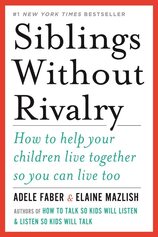 I finally finished reading Siblings Without Rivalry: How to Help Your Children Live Together So You Can Live Too by Adele Faber and Elaine Mazlish, and I thoroughly enjoyed it. It was a much shorter book than How to Talk So Kids Will Listen, but I still learned a lot from it and appreciated the quick tactical advice and specific scripts/language included. I now understand why this is the classic book about sibling relationships. See my main notes/takeaways below. Kids should express all their feelings and anger but not act them out
Acknowledge the feelings and put them into words A comment like that mak would make you mad I can hear you’re really mad at her Give in fantasy what you can’t give in reality You don’t want her here. Sometimes you’d wish she would go away. That would be annoying. You wish he’d check with you first. Help children channel feelings into creative outlets No hurting her. You can show me your feelings in your x That’s no fun being left behind. Want to draw me a picture of how you feel? I think she needs to know how enraged you are in writing. Tell her how angry you are with words not fists I expect you to confront her without calling names Make a private property sign I can’t let you hurt me. But I can let you show me what you’re feeling with this doll. Parent write down list of everything child saying. List of top 5 complaints. 3 perils of comparisons Never compare Describe what you see Describe what you like Describe what you don’t like Describe what needs to be done No reference to sibling Avoid favorable or unfavorable comparisons Parents see kids as separate individuals Love each uniquely and individually rather than equally Instead of claiming equal love, show how love each individually Don’t show favoritism Don’t give equal time but based on need 5 siblings in roles Don’t assign sibling in to role like clown or good one or neat one Don’t compare their abilities to each other for determination of hobbies or activities. Do those for pleasure and learning sake not just about accomplishment or talent. Arts and sports are for everyone No more bullies Mention their capacity to be nice No more victims Give them words to fend for self Treat kids as basically capable and all ok No more problem children Encourage ability 6 when kids fight Acknowledge anger for each other and the difficulty they are in Express fishy in their ability to find mutually agreeable solution Leave the room When about to cause physical harm Describe what you see Say this is a very dangerous situation and we need to cool off Separate them No hurting allowed in our home Ask is this a play fight or a real fight Don’t force kids to share but encourage out of goodwill If kids can’t decide between themselves, call a meeting and explain the ground rules Write down each child’s side Have everyone write down solutions Decide on solutions you can all live with Follow up When kids conflict: State each child’s feelings, explain the priorities, then leave Put kids in charge of the sharing Explain the benefits you can get from the sharing (novel combinations, etc.) Show appreciation for sharing when it happens Model sharing yourself If older child constantly taking advantage of younger and younger doesn’t mind, don’t interfere because it won’t last forced 7 making peace with the past Afterword Coping with young rivals Fun activities for all Find ways to make older one look good and useful to younger one like to teach or model Property rights Policy about property Most things in house can be used by anyone But some things are so special or new or delicate that not for sharing and need to ask permission A sign for private property Designated shelf for each kid for own stuff When shelves bulge then review periodically which have to remain there A strange urge to snap out of another’s hand Rule of no grabbing and instead need to ask nicely To punish or not to punish Each child should get alone time with each parent daily When spending time with one child, don’t talk about the other Don’t withhold affection from favorite child Just give each full unique appreciation Birth order Let kids switch roles and play Let child know what it is about them that sibling likes Schedule family meetings Discuss chores Discuss what’s working and not Make formal printed invitations
0 Comments
Your comment will be posted after it is approved.
Leave a Reply. |
Archives
June 2024
Categories
All
Subscribe |
 RSS Feed
RSS Feed
